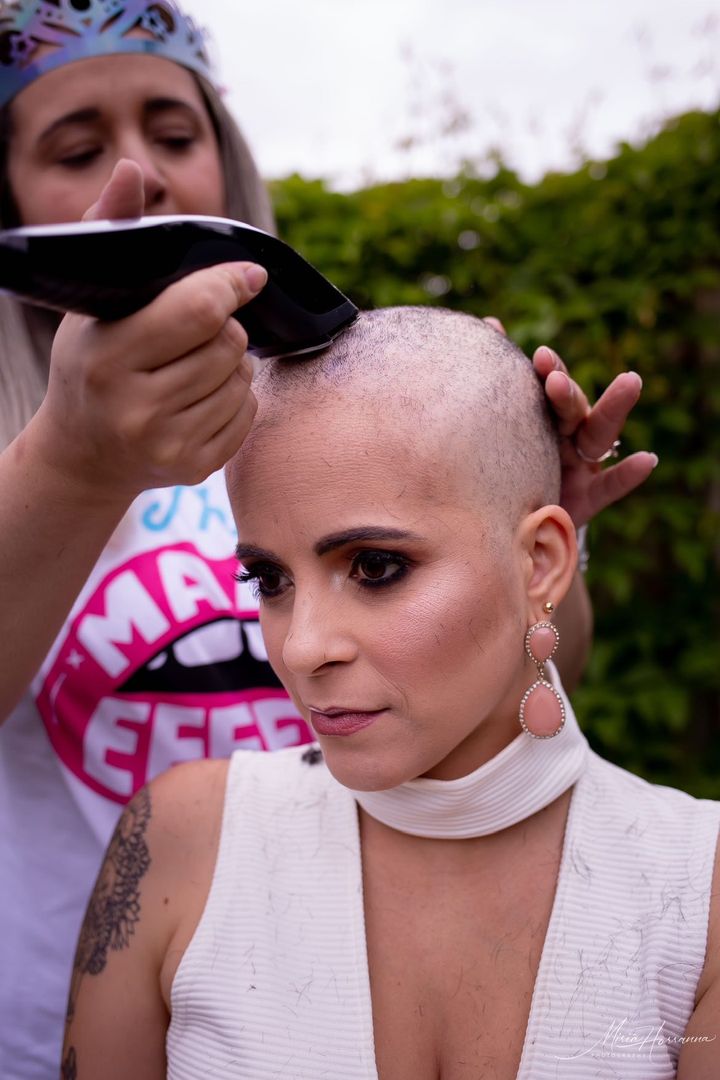
Bruna Cristine Cacciaguerra, Ashford |PICTURE: Adrian Butler
AS SHE opens the door of her home in West Limerick, Brazil native Bruna Cristine Cacciaguerra is proudly wearing a white and pink T-shirt stating ‘F*** cancer’ in bold letters. Despite the gloomy days ahead, her smile lights up the room.
With the help of a crutch, Bruna heads to the couch to recall one Friday night in December, 2020, when life took a turn.
“I was just divorced, it was the first time that I was receiving a friend in my apartment, so I was very happy. I was showering and felt this lump here,” she says while pointing at her breast.
“I thought it was because of the stress and the divorce,” she pauses. “Two weeks later, the lump was bigger and sore.”
At the time, the 30-year-old had been breastfeeding for three years. At first, her GP told her that she was too young to have cancer. But because of her family history, the doctor suggested emergency scans.
“As soon as she got the scans done, they knew it was cancer. Then, they discovered it was triple negative cancer,” she recalls.
An invasive type of breast cancer, triple-negative breast cancer is not receptive to hormonal therapy medicines – which means the cancer cells don’t have receptors for oestrogen, progesterone and HER2 protein. Aggressive and harder to treat, this type of cancer is more likely to come back.
In April 2021, Bruna started chemotherapy, followed by a mastectomy. “Then, I had another chemo. I never responded well to the treatment. The tumour got back, it spread to my hips, so now I have trouble walking,” she explains.
“I had 15 sessions of radiotherapy. I have metastatic cancer, it’s in my lungs and in my spine.”
During her last consultation, Bruna was told there was not much more the doctors could do. “We’re focusing on palliative care to treat the pain and give me as much time as possible. They said they don’t expect me to live more than a few months,” she says softly.
But, Bruna is positive by nature. “You keep thinking maybe it’ll work. It’s hard to listen because I’m a very positive person. I do believe that I can live more than a few months. Nobody knows when someone is going to die,” she states.
“I know that the diagnosis is very bad, I'm preparing for the worst because I have three kids. But I do believe that I will live more than a few months. I won’t be waiting at the house for my day to die.”
To help Bruna and her children visit their family in Brazil, her friend set up an online fundraiser. “It helps a lot because I haven’t seen my family in five years. They don’t know my daughter. The last time I was there was when my father passed away,” she says.
Even though she is in palliative care, Bruna remains incredibly positive. It only takes a second to notice she is sunshine in human form.
“I'm very grateful. Life had always treated me so well, and I don’t know why I would think it’s not good – even with cancer.”
Often, people ask her why she doesn’t want to go back to Brazil. “I love Ireland. I’m going back there to see my family. But my place is here,” she smiles.
“In Brazil, it’s sunny every day. But here, when the sun is out, you feel so happy.”

On those days, Bruna spends time with her children. For her, the little things matter most. “It's so nice to enjoy the little things. That’s what the cancer is teaching me. It’s just a disease, not a way to live.”
She describes her children as happy and kind. “They know their mom is very sick, but I'm not using ‘the word.’ They know that bad things can happen to people when they are too sick,” she says.
The hiking lover has “big plans” for this summer. “Every weekend, I used to go on walks. This summer, I want to discover Ireland, and see places I’ve never seen before.”
By sharing her story, Bruna hopes to raise awareness. “I think every woman should do the checks early. Breast cancer can’t be avoided, but it can be discovered at the beginning and be treated. If I had discovered it early, I’d be OK now.”
Pulling at her T-shirt, she recalls: "My friend made it when I finished the first chemo, we thought it would be the only one. We took pictures, shaved my head, and had champagne. Everybody was crying, but for me, it was just hair – the smallest of my problems."
After swiping through pictures of her party, she cheerfully asks: “Do you want to see the cabin?
“It’s very peaceful, I love to be here,” she says as she looks for her crutch. “I forgot my friend, I need to name her.” After a quick debate with this reporter, she decides: “She looks like a Mary.”
In the garden in Ashford, Bruna shares tales of summer barbecues, children playing and friends visiting – with a special mention for the foxes who occasionally pop by to say hi.
As the conversation comes to an end, Bruna insists on accompanying her visitor to the door. “We have a saying in Brazil. ‘If we walk people to the door, they’ll come back’,” she says before inviting us back for tea.
To help Bruna, donate here.
Subscribe or register today to discover more from DonegalLive.ie
Buy the e-paper of the Donegal Democrat, Donegal People's Press, Donegal Post and Inish Times here for instant access to Donegal's premier news titles.
Keep up with the latest news from Donegal with our daily newsletter featuring the most important stories of the day delivered to your inbox every evening at 5pm.